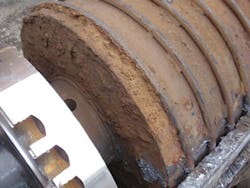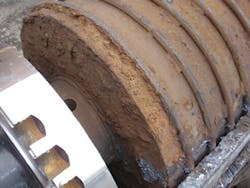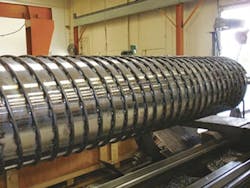Special Report: Firms offer maintenance for heat-transfer rolls
Matt Menges, president and owner of a company that supplies process rolls, is kind of a cardiologist for heat-transfer rolls.
Damage to the rolls can be devastating for film and sheet manufacturers, who rely on the liquid running through them to provide precise temperature control to the products coming off their lines. Problems in the pipes can build up over time, though like the damage that causes heart attacks, they often go unnoticed until it's too late, Menges said.
"The arteries are clogged," said Menges, of Menges Roller. "These are arteries, really."
Regular roll cleaning is a must, companies that make and refurbish the products say. According to Graham Engineering, which has supplied its Welex-brand sheet lines to more than 3,000 facilities, users should check their rolls' concentricity at least once a year. They should also drain the internal heating and cooling systems annually, as well as before putting rolls into storage. In addition, the company recommends using chlorine-free, nonabrasive cleansers to regularly clean and polish roll surfaces to remove residue from polymer vapors or products that have hardened.
Companies such as Menges Roller and Roll Technology Corp. offer maintenance and cleaning services at their facilities, where rolls are shipped and treated with caustic chemicals that production plants aren't equipped to handle.
Off-spec thermal transfer from poorly maintained rolls can slow the sheet take-up process, or even damage the product; failure can cripple production, Menges said. "The problem is when it breaks down, they don't have another one, and another one is three months away, and the downtime is excruciatingly expensive."
To help customers better understand what's at stake, Roll Technology, a company that finishes and restores rolls, now offers thermal imaging. Shots taken prior to cleaning reveal unexpected hot or cool spots created by contamination, where the process water cannot flow as intended. The company also has begun offering a vibratory cleaning process, in addition to acid flushes.
"A lot of times, it has a tremendous impact as far as loosening scale or blockage that might be impeding the roll," Executive VP Greg Haley said. Roll Technology's service has salvaged rolls that might otherwise have had to be replaced at huge expense.
Menges and Haley said their companies can clean rolls in about a week or so.
Menges said that users often wait too long to service the rolls, or chalk up problems, such as slowing take-up speeds or poor film adhesion, on the film itself or other parts of the equipment.
If productivity has slowed, he said operators should rule out problems with the rolls.
"They don't really put two and two together, that inside that roll, it's not conducting the proper thermal transfer," he said.
He urged users to look at the liquid they're putting into the rolls. Hard water is the most common culprit when rolls fail, but monitoring and maintaining appropriate pH levels can keep the rolls running smoothly.
"It's because it's corroding on the inside, like a radiator on your grandfather's car," Menges said.Infrared devices can also be used to quickly identify a problem with the rolls, he said. "Is it running at 80 degrees here and 120 degrees over there?" he asked. "If so, there's a blockage."
Both Menges Roller and Roll Technology provide a full slate of roll repair services, including refinishing and replating. Common causes of damage include improper cleaning of the roll surface, collisions with tools or the die, and gradual wear.
While Menges said that a lot of users are still too lax with routine cleanings, Haley said his company has seen an uptick — at least when the equipment's already down for other reasons.
"Most converters are realizing that it's a benefit to go ahead and get it cleaned while the roll's in for service," Haley said. For them, he said thermal imaging can help determine whether a damaged roll is salvageable — and it can reveal post-cleaning benefits. Unfortunately, he said, "We've had a few rolls that there's just not hope for."
Keeping a spare roll at the ready can help companies prepare for the worst, but Menges noted that there's no substitute for prevention. He pointed to a customer that brought in a clogged roll in March; in its place, the customer was running a spare roll — that could handle only a third the capacity.
"If they monitored that correctly," he said, "they wouldn't have this problem."
Karen Hanna, copy editor
For more information
Graham Engineering Corp.,York, Pa., 717-848-3755, www.grahamengineering.com
Menges Roller Co.,Wauconda, Ill., 847-487-8877, www.mengesroller.com
Roll Technology Corp.,Greenville, S.C., 866-605-6404, www.rolltech.com
About the Author
Karen Hanna
Senior Staff Reporter
Senior Staff Reporter Karen Hanna covers injection molding, molds and tooling, processors, workforce and other topics, and writes features including In Other Words and Problem Solved for Plastics Machinery & Manufacturing, Plastics Recycling and The Journal of Blow Molding. She has more than 15 years of experience in daily and magazine journalism.


